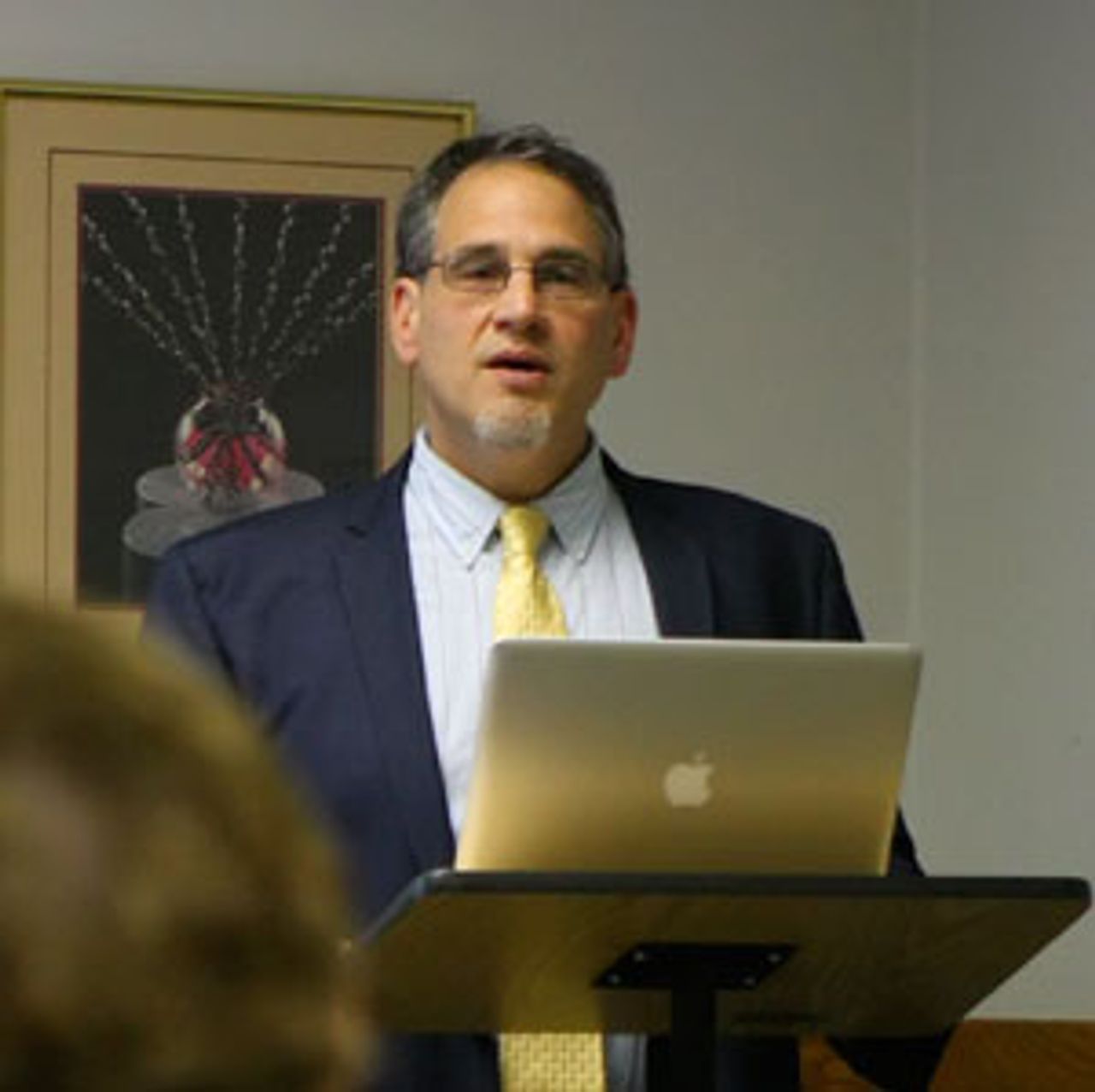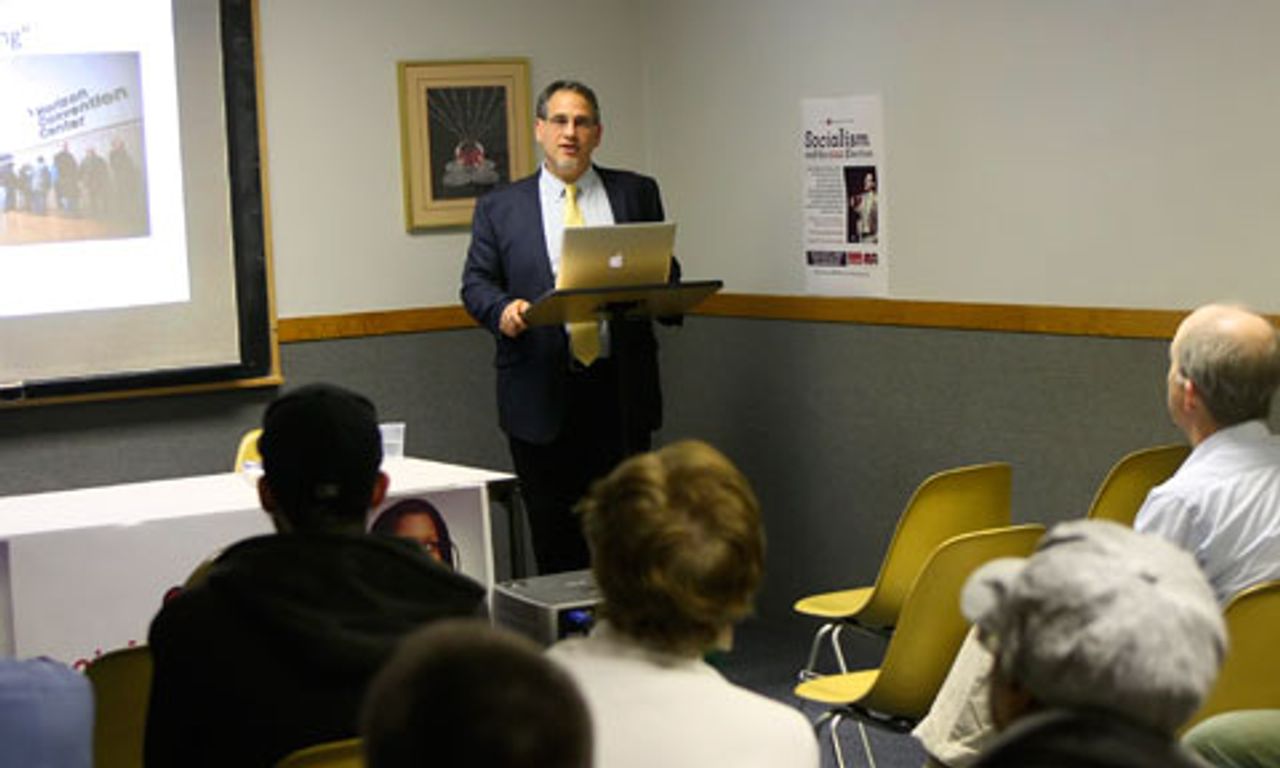 White addressing the meeting
White addressing the meetingJerry White, the Socialist Equality Party candidate for US president, addressed an election meeting at Wayne State University in Detroit Monday evening. The campus chapter of the International Students for Social Equality hosted the event.
The meeting took place in the wake of the announcement of draconian budget cuts by the administration of Democratic Mayor Dave Bing. These include ten percent pay cuts for city workers, the layoff of 160 Fire Department personnel and a 10 percent cut in the city bus system. The cuts will shred what little remains of services in Detroit, the poorest big city in the United States.
Attending the meeting were students from Wayne State University and the College for Creative Studies, teachers, city workers, retirees and other workers. In his report White focused his remarks on the crisis in Detroit, where the massive budget cuts being proposed by the Bing administration illustrate the gang up of both big business parties against the working class.
 The meeting at Wayne State University
The meeting at Wayne State University“From Detroit, to Washington, to Athens, to Paris, the refrain from the official political parties is the same: there is no money to provide decent paying jobs, to fund public education, to relieve college students of crippling debt, to provide health care that can prolong and improve the quality of life for the working class,” said White.
He warned that the Obama administration was using Detroit as a model for attacks on the working class to be carried out across the United States. The only force that could stop this, said White, was the American working class, fighting in unity with the working class throughout the world.
White reviewed the long history of struggle by the working class in Detroit, from the Hunger March in 1932 to the ghetto uprising in 1967. He explained how, in the wake of the mass struggles of black workers and youth against conditions of poverty and oppression, the ruling class had cultivated a layer of African American elected officials as a basis of support for capitalism.
“In the final analysis, racial politics has always been utilized to divide and weaken the working class—and to pit workers against each other in a struggle over ever fewer resources,” White said. “The only answer to this is the struggle to unite the working class to reorganize economic life on the basis of a rational and democratically drawn up plan, based on the principle of production for human need not private profit.”
Following White’s report there was a lengthy discussion.
In response to a question about the party’s analysis of the role of the unions, White noted that the Trotskyist movement had played a key role in founding the industrial unions in the 1930s, particularly in the struggles in Minneapolis. “Very rapidly,” said White, “in the 1930s the leaders of the newly formed Congress of Industrial Organizations sought to channel the working class upsurge behind the Democratic Party. John L. Lewis, the leader of the CIO, appealed directly to the employers and the government. If the employers recognize the unions, he said, the unions will become the greatest bulwark against socialism. In the aftermath of World War II, United Auto Workers President Walter Reuther and Lewis carried out a purge of the trade unions of all socialist and left-wing workers.”
White pointed to the fundamental transformation of the trade unions that took place beginning in the late ’70s. In 1979 the United Auto Workers was brought onto the board of directors of Chrysler. “You then had Reagan’s firing of the air traffic controllers, the Greyhound strike, meat packers, coal miners. In every case the trade unions isolated the workers and helped defeat them. They wanted to get the more militant workers off their backs in order to incorporate more fully into management.”
The degeneration of the trade unions was a global process, White explained. “It is not just corrupt leaders. It is the failure of the nationalist and pro-capitalist policies of the trade unions. These organizations have transformed themselves into corporatist organizations hostile to the working class.”
White said that the SEP did not aim to reform these bankrupt organizations but called instead for the building independent rank-and-file committees controlled by the workers themselves.
A supporter of the Occupy movement said he saw that the Democratic Party was trying to co-opt Occupy. “I don’t think that will ever happen,” he added.
White responded by pointing out that the great vulnerability of the Occupy movement was its slogan of “no politics.” “In the end ‘no politics’ means the domination of the present politics. It means the domination of the politics of the ruling class,” White said. “There is no neutral politics. ... The working class needs politics, a leadership and a political program.”
Lawrence Porter, chairman of the Committee Against Utility Shutoffs, spoke in the discussion on the potential impact of further cuts to the Detroit Fire Department. He pointed to a fire last January on the east side of Detroit where two people died. “The grandmother and the grandson were able to get out, but the nearest fire station was shut down. So the older woman was trying to fight the fire with a garden hose. When the fire department finally did show up, there was so much anger, there was what some described as a near riot.”
He said the incident was a microcosm of the kind of social tensions that exist in Detroit. “There is cut after cut. We are being told to live with less. Let’s learn the lessons of history. These are not individual problems, they are the problems of a system.”
A worker asked if there was room in the political system for a socialist party or a labor party. White responded by pointing to the efforts of both Democratic and Republican politicians to exclude third parties from the ballot and the censorship by the big business media.
White continued, “The basis for socialism isn’t the permission of the billionaires, it is the objective crisis of society.”
He explained that as the politics of war and austerity come into conflict with the population, the ruling class could no longer allow democracy. “How do you democratize society? It requires a revolution, the working class taking power.”
Following the meeting, Eric, a worker at the Veterans Administration, spoke to the WSWS. “Listening has shed a lot of light on what is going on now in the labor movement. I have watched for years how the Democrats and the unions have sold us out. The unions now sit on boards with management. How can that be? Jerry White shed a lot of light on how it all took place.
“I was a lifelong Democrat. What shook me up was when Kerry was running against Bush and it came down to ‘vote for me because I am not him.’
“Every time you wake up you have lost more. Twelve hours a day is now a norm at my workplace. You can’t raise a family if you are at work all the time. All the things you call community, you have lost.”
